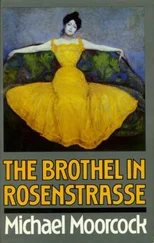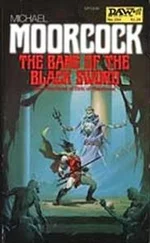Michael Moorcock - Breakfast in the Ruins
Здесь есть возможность читать онлайн «Michael Moorcock - Breakfast in the Ruins» весь текст электронной книги совершенно бесплатно (целиком полную версию без сокращений). В некоторых случаях можно слушать аудио, скачать через торрент в формате fb2 и присутствует краткое содержание. Жанр: Фантастика и фэнтези, на английском языке. Описание произведения, (предисловие) а так же отзывы посетителей доступны на портале библиотеки ЛибКат.
- Название:Breakfast in the Ruins
- Автор:
- Жанр:
- Год:неизвестен
- ISBN:нет данных
- Рейтинг книги:3 / 5. Голосов: 1
-
Избранное:Добавить в избранное
- Отзывы:
-
Ваша оценка:
- 60
- 1
- 2
- 3
- 4
- 5
Breakfast in the Ruins: краткое содержание, описание и аннотация
Предлагаем к чтению аннотацию, описание, краткое содержание или предисловие (зависит от того, что написал сам автор книги «Breakfast in the Ruins»). Если вы не нашли необходимую информацию о книге — напишите в комментариях, мы постараемся отыскать её.
Breakfast in the Ruins — читать онлайн бесплатно полную книгу (весь текст) целиком
Ниже представлен текст книги, разбитый по страницам. Система сохранения места последней прочитанной страницы, позволяет с удобством читать онлайн бесплатно книгу «Breakfast in the Ruins», без необходимости каждый раз заново искать на чём Вы остановились. Поставьте закладку, и сможете в любой момент перейти на страницу, на которой закончили чтение.
Интервал:
Закладка:
"I'm glad to see you," said Marsden. "I'm being eaten alive in here. What a place to choose! Is it always like this?"
"Usually, I'm afraid to say." Karl tried to sound completely English, but to his annoyance, he could still detect a slight lilt in his voice. The lilt, he knew, betrayed him.
The sailor held out his hand for the bag. Karl saw that red lumps were rising on virtually every spot of the man's bare skin. "Come on, then, old son," said Marsden, "let's see if it's the genuine article."
Karl smiled ingratiatingly. "It is one hundred percent perfect stuff, Mr. Marsden." He put the bag at his feet and spread his hands. "Can I say the. same about your cash, sir?"
"Naturally you can. Of course you can. Don't say you don't trust me, you little baboo! It's me should be worrying."
"Then let me see the money, sir," Karl said reasonably. "I am sure you are an honorable man, but..."
"You're damned right I am! I won't have a bloody darkie..." Marsden looked round nervously, realizing he had raised his voice and it was echoing through the church. He whispered: "I'm not have a bloody darkie telling me I'm a welsher. The money's back at the ship. I'd have been a fool to come here alone with a hundred quid on me, wouldn't I?"
Karl sighed. "So you do not have the money on your person, Mr. Marsden?"
"No I don't!"
"Then I must keep the bag until you bring the money," Karl told him. "I am sorry. Business is business. You agreed."
"I know what we agreed," said Marsden defensively. "But I've got to be certain. Show me the stuff."
Karl shrugged and opened the bag. The aroma of hemp was unmistakable.
Marsden leaned forward and sniffed. He nodded.
"How much money do you have with you?" said Karl. He was beginning to see that Marsden had been exaggerating when he had said he would buy as much as Karl could find.
Marsden shrugged. He put his hands in his pockets. "I don't know. It's mainly in rupees. About four pounds ten."
Karl sniggered. "It is not a hundred pounds."
"I can get it. Back at the ship."
"The ship is nearly fifty miles away, Mr. Marsden."
"I'll give it you tomorrow."
When Marsden jumped forward and grabbed up the bag, Karl didn't move. When Marsden pushed him aside and ran with the bag up the aisle, Karl sat down in one of the pews. If Marsden really did have four pounds ten, then at least Karl would have lost nothing on the deal. He would return the bag to his friend in Armenian Street and wait until he had a proper customer.
A short while later the young Sikh from Delhi came into the church. He was holding the bag. The Sikh had been staying at the Imperial Indian Hotel and had had trouble paying his bill. The manager of the restaurant had told Karl this and Karl had told the Sikh how he could earn the money to pay for his room. The Sikh evidently did not relish working for Karl, but he had no choice. He handed Karl the bag.
"Did he have enough money?" Karl asked.
The Sikh nodded. "Is that all?"
"Excellent," Karl told him. "Where is Marsden now?"
"In the tank. He was probably drunk and fell in there. It happens to sailors, I hear, in Calcutta. He may drown. He may not."
"Thank you," said Karl.
He waited for the Sikh to leave and remained in the church for some minutes, watching the mosquitoes dancing in the light from the windows. He was a little disappointed, he had to admit. But sooner or later another deal would come, even if he had to work a trifle harder, and there was no doubt that his savings would increase, that his ambitions would be realized.
A priest appeared from behind the altar. He saw Karl and smiled at him. "You're early, laddie, if you've come for the choir practice."
— You're learning, says the black man lasciviously. You see, I said you would.
Karl smiles up at him and stretches.—Yes, you said I would. It's funny...
— You were saying about that girl-friend of yours. The black man changes the subject.—How she became pregnant?
— That's right. Before the abortion reforms. It cost me the best part of two hundred pounds. Karl smiles.—A lot of uniforms.
— But the other two were cheaper? The two before?
— They got those done themselves. I was always unlucky. I couldn't use those rubber things, that was the trouble. I'd just lose interest if I tried to put one on.
— None of your children were born?
— If you put it like that, no.
Let the next one be born. The black man puts his hand on the muscles of Karl's upper forearm.
Karl is astonished at this apparent expression of human feeling.—You're against abortion, then?
The black one rolls over and reaches for his cigarettes on the bedside table. They are Nat Sherman's Queen Size Cigaretellos, an obscure American brand which Karl hasn't seen before. Earlier he has studied the packet with some interest. He accepts one of the slim, brown cigarettes and lights up from the tip of the black man's. He enjoys the taste.
— You're against abortion, then? Karl repeats.
— I'm against the destruction of possibilities. Everything should be allowed to proliferate. The interest lies in seeing which becomes dominant. Which wins.
— Ah, says Karl, I see. You want as many pieces on the board as you can get.
— Why not?
You are a refugee fleeing from a government which will kill you and your family if they catch you.
You reach the railway station and in a great deal of confusion manage to get your wife and children onto the train, telling them to find a seat while you get the luggage on board.
After a while you manage to haul your luggage into the train as it is leaving the station. You settle it in the corridor and go to look for your family.
You search both ends of the train and they are not there. Someone tells you that only half the train left, that the other half is going to another destination.
Could they have got into the other half by mistake?
What will you do?
Pull the communication cord and set off back to the station, leaving your luggage on the train?
Wait until you reach the next station, leave your luggage there and catch the next train back?
Hope that your family will remain calm and follow you to your ultimate destination on the next available train?
8
Quiet Days in Thann: 1918:
Mixed Meat
Never, probably in the history of the world, not even in the last years of the Napoleonic domination, has there taken place such a display of warlike passion as manifested itself in the most civilized countries of Europe at the beginning of August, 1914. Then was seen how frail were the commercial and political forces on which modern cosmopolitanism had fondly relied for the obliteration of national barriers. The elaborate system of European finance which, in the opinion of some, had rendered war impossible no more availed to avert the catastrophe than the Utopian aspirations of international Socialism, or the links with which a common culture had bound together the more educated classes of the Continent. The world of credit set to work to adapt itself to conditions which seemed, for a moment, to threaten it with annihilation. The voices of the advocates of a world-wide fraternity and equality were drowned in a roar of hostile preparation. The great gulfs that separate Slav, Latin, Teuton, and Anglo-Saxon were revealed; and the forces which decide the destinies of the world were gauntly expressed in terms of racial antagonism.
HISTORY OF THE WAR Part One. Published by "The Times", 1915.— It's your turn now, says the black man.—If you like...
— I'm tired, says Karl.
— Oh, come now! Tired! Psychological tiredness, that's all! The black man pats him on the back. He gives Karl an encouraging grin, offering him the riding crop.
Читать дальшеИнтервал:
Закладка:
Похожие книги на «Breakfast in the Ruins»
Представляем Вашему вниманию похожие книги на «Breakfast in the Ruins» списком для выбора. Мы отобрали схожую по названию и смыслу литературу в надежде предоставить читателям больше вариантов отыскать новые, интересные, ещё непрочитанные произведения.
Обсуждение, отзывы о книге «Breakfast in the Ruins» и просто собственные мнения читателей. Оставьте ваши комментарии, напишите, что Вы думаете о произведении, его смысле или главных героях. Укажите что конкретно понравилось, а что нет, и почему Вы так считаете.








